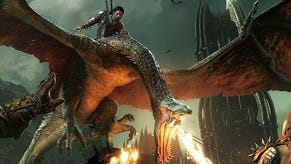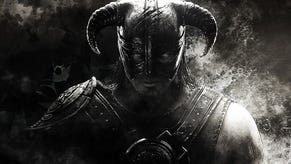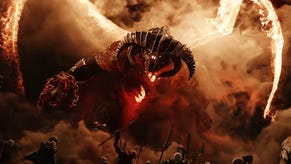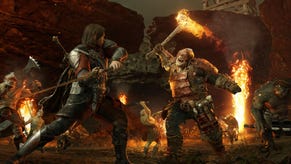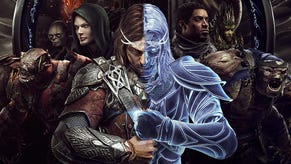Middle-earth: Shadow of War: All the Ways in Which Shadow of War Will Be More Difficult This Time Around
INTERVIEW | "The most competent skilled players would have the worst experience of the Nemesis System because people would just kill them and that was that."
This article first appeared on USgamer, a partner publication of VG247. Some content, such as this article, has been migrated to VG247 for posterity after USgamer's closure - but it has not been edited or further vetted by the VG247 team.
Middle-earth: Shadow of War carries on an interesting legacy from 2014's Shadow of Mordor. The first Middle-earth game was very popular, but it was also criticized for being too easy and too repetitive, as well as for not being faithful enough to the source material. Shadow of War is partly a reaction to that criticism, which became clear in the course of our interview with Monolith Productions vice president of creative Michael de Plater.
Here's what de Plater had to say on Shadow of War's attempts to balance out the difficulty; its dark subject matter, and its new loot system, as well as the various ways to troll the orcs using the new "shame" mechanic.
USgamer: What was the the one thing Shadow of Mordor was missing that was really important to get right in Shadow of War?
Michael de Plater: If I was going to pick one, it would be paying off the promise of the Nemesis System to create really memorable stories, characters, villains, and followers. So really expanding the emotional palette of those stories.
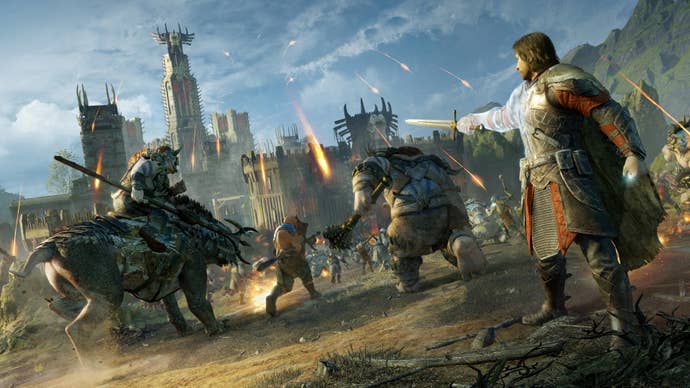
USgamer: So Shadow of Mordor didn't quite pay off on that promise?
de Plater: I think it laid the foundation and it taught us a lot because we saw that people could react really emotionally and strongly. They could love to hate these enemies... they'd kill them or want revenge on them. We saw certain types of stories recur, and we wanted to increase the variety of those stories, and then also make them more emotionally intense. So they hated them even more, or loved them even more. Doubling down on that. The other thing we found was that in Shadow of Mordor there was a big variety of how effective those stories were. So some people, and quite a lot, like a big percentage, we're in this sort of nice span where they were having a good experience. They would have a character they would remember.
But there were some people for whom it was too hard, and they would drop out because they were getting slaughtered. And then there were the people who were too skillful and never die. The most competent skilled players would have the worst experience of the Nemesis System because people would just kill them and that was that. So we wanted to expand the system so that everybody would have the most memorable, personable enemies, and if we know somebody's really good, we can use that to trigger a particular type of enemy or assassin to come after them. If somebody's having a harder time, we can do that in a very story aligned way where the orc will come out and save them.
USgamer: Yeah, I had a system where I would find their weakness, scare them away, and chase them until I caught and dominated them. Then I would just kill them.
de Plater: That thing with it being too easy I think we've addressed quite a bit. There's quite a bit more variety in the abilities the orcs have in terms of their strengths and weaknesses and their ability to react and respond and even adapt if you're doing a repetitive thing. A particular example: Sometimes when they run and try to get away, some are better at escaping because they can jump on a caragor and escape; tricksters can use a smoke bomb to escape, some guys can lead you into ambushes. So that particular story, we wanted to have more variety and more surprises and more ways they would find a way to live another day.
"[W]e wanted to expand the system so that everybody would have the most memorable, personable enemies, and if we know somebody's really good, we can use that to trigger a particular type of enemy or assassin to come after them."
USgamer: The Nemesis System was hailed as a big next-gen thing when it came around in 2014, but it was never really adapted by other studios. Why do you think that is?
de Plater: I can't really speak for other developers, but I can say that from our point of view is that it's really hard, especially to take it and expand on it and flesh it out and make it deeper and richer. It's hard from a content point of view; it's hard from an execution point of view in terms of making all these pieces work together in terms of the writing and animation and character art. And I think there's a lot of things that have to click together to make it work. Even the way in which Talion works with death and resurrection. Having time move forward. Having them remember having killed you. Having the orcs work in such a way that cheating death and being really heavily scarred. So there are a lot of components of our fiction and our design that really click together.
USgamer: In the original game you could interrogate or simply kill orcs. Seems like you took those abilities out?
de Plater: The interrogation we do now just through the worms and messages. But we do have the ability to shame them and mess with their minds in order to lower their levels, which you can do either because they're too powerful to join your army, or because you want to humiliate them. And what's really fun is that they can become completely broken, sort of Reek in Game of Thrones, or they can snap and become these complete maniacs, sort of Jason Vorhees style. The orcs are already crazy and kind of ramped up on their orc grog, but as you mess with their mind they can go in all sorts of crazy directions.
USgamer: One of the key criticisms of Shadow of Mordor was that you could become overpowered pretty fast. How are you addressing that in Shadow of War?
de Plater: In a number of different ways. I mean in Shadow of Mordor, we did that sort of intentionally--to start underpowered and end up overpowered. We're trying to make a game that sustains much, much longer now, and is in some ways an RPG as much as an action game. Your sort of character growth and customization will be more balanced. You'll have an enormous range of powers, but some of them won't stack, you'll have to choose between them. So you'll have more freedom to play as you want, but less ability to become just straight-up overpowered. The orcs also have a lot more powers and abilities, so they can grow a lot more and become a lot more challenging. Plus we'll have different difficulty levels. In many ways, [hard mode] is the most fun way to play the game, because you'll need to have intel and plan and you will die, so you do tend to have the most intense experiences when you play that way. And dynamic difficulty is much smarter and more reactive to how people are playing.
USgamer: Any particular ability you want to tune?
de Plater: There was one ability that would let you lower the number of attacks needed to do an execution attack. You could do two execution attacks whenever that ability was charged, and I think we might have even enabled a multi one for that as well. So basically you could get into a very easy loop of hitting guys twice and executing them. Now you have to make a choice: do you want to lower the threshold of how often you want to do those things, or do you want to increase the power of them, or do you want to make them not rely on your hit streak?
USgamer: Could you explain how the Nemesis System works in the context of the warchiefs? So the towers have a set of warchiefs that you can fight all at once. Will the towers have one set of chiefs while the open world has a set of their own?
de Plater: No, no, it's all the same. So the warchiefs are responsible for the garrison of that fortress. Say that you're preparing to assault that fortress: You could assassinate the warchiefs ahead of time, in which case it would work just like the Shadow of Mordor. Or you could assassinate their bodyguards and either kill or dominate them and have them turn against the warchief either during the siege or previously. Or you could spend time leveling up and approaching them. Sort of the way we thought of it was that in Shadow of Mordor we had these warchiefs, but once you defeated them or dominated them, there was no goal after that. So now the fort assault is really an extra level that sits above the way the warchiefs worked last time. But you still have all the possibilities from before.

USgamer: One of the things I hear a lot about with Shadow of Mordor is that it's very dark and violent for a Tolkien game. What's your perspective?
de Plater: With Shadow of Mordor, we were really inspired by the notion of evil and power turning on itself. So at the fortress of Cirith Ungol where the orcs start fighting over the Mythril shirt and they turn on one another and kill each other. And then again when the uruk-hai have Merry and Pippen and they start arguing and tear into one another. I think it's very aligned with those ideas. But then the idea we get to explore in our story is what the ultimate consequence is of turning evil against evil. Celebrimbor obviously has a lot in common with Saruman in terms of using fire to fight fire, power to defeat power. That's actually quite a big thing to change in the movies--that Saruman was a conscious puppet of Sauron. It's quite a big thematic change. So in that sense I think we're more aligned with the books in that Celebrimbor thinks that's the only way to win, and then Talion is of course... he's more conflicted than Boromir was.
USgamer: Seems like he's in for a bad end.
de Plater: I guess we'll see!
USgamer: He's very violent. He's leading an army of orcs. Seems like it could only end in tragedy.
de Plater: But then there's also Sam holding the One Ring looking over the mountains fantasizing that he could be Sam the Mighty and lead an army through there. That notion of the glory of battle. It may be a tragedy, but you wonder what they could achieve in terms of saving the world.
USgamer: A lot of people have told me that they stopped around the midpoint because they didn't want to fight through a fresh wave of captains. How did you take that piece of feedback and incorporate it into Shadow of Mordor?
de Plater: There's a lot of ways. Part of it is that we put a lot more emphasis on the story and the goals of the story and the missions. We're doing a lot of testing, so when we see people playing, we're asking what their next goals are and what they want to do. Plus I think we have a lot more richness and diversity in the Nemesis System. In Shadow of Mordor I think we initially had that notion of being behind enemy lines and building an army, but we really didn't have the goals to pay that off, and now that is a much more meaningful goal. Plus, a lot of the growth and the RPG elements, the world is richer and more compelling to explore. There's a lot more goals, and each of those goals are a lot more compelling, and the balance is much stronger than ever. So I think there are a fewer break points where people will want to drop the game.
USgamer: What does the loot add to the game?
de Plater: Loot adds the sense of player growth and customization, and also the strategic dimension where as well as having growth you can optimize your loot and your gear and traits to your playstyle, and so on as well. So it's a level of freedom and an extra layer of strategy plus the expression where visually it's really cool.
USgamer: Can you give me an example of how you can customize it to your playstyle?
de Plater: So as you hunt down and defeat legendary members of tribes, they'll drop pieces based on all the different weapon types, plus the armor, plus the cloak. Then they unlock different challenges that you can do. But when you get those epic sets, they come with advanced powers. So for example, the Elven Set really extends your power to use Elven Wrath at the expense of being a bit more vulnerable, but being able to unleash that more often. Others can specialize more in upgrading and empowering your followers, or your ability to call in your mounts quicker. Others can be more toward stealth. So there's a really extensive list of different traits and attributes.
USgamer: What's your pitch to skeptical Tolkien fans?
de Plater: I think this is oversimplifying things but I would say they should just play it before making any judgment. People make a lot of assumptions with how we deal with the lore that isn't necessarily the case if they actually play it or see the story.
For more on the game head over to our Middle-earth: Shadow of War - Everything we Know article.




